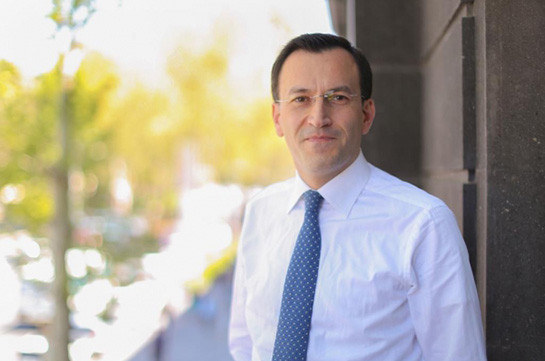
02/05/2019 18:55
Desire to keep pace with best international practices is in our DNA
Interview with Ara Sargsyan, Head of Financial institutions division of Assets, liabilities and capital management center at Ameriabank.
Does attraction of large sums from international financial institutions indicate the trustworthiness of Ameriabank, or is this just win-win business?
Well, no transaction in real business goes through, if it’s not mutually beneficial. However, an important factor, if not the most important factor above all the commercial terms and conditions is the trust and the way investors or lenders believe in your success story. Since 2008 we have been able to raise more than $1 billion from international financial institutions (IFIs). I think the sheer volume of funds and the number of our overseas partners (and we work with all major IFIs) speak very loudly about the very trust of our partners – trust in our business, our aspirations and the way we work to materialize them. As a matter of fact, two of our long standing partners – the European Bank for Reconstruction and Development and the Asian Development Bank – acquired equity stakes in Ameriabank, thus affirming the trust we earned during years of cooperation.
There are two mutually exclusive opinions about the debt-carrying capacity of Armenian economy: some experts think that economy suffers from lack of credit resources, while others argue that economy is over-indebted. What’s your opinion?
Firstly, loans to GDP ratio in Armenia is 45% which is way lower than that in developed countries. Therefore I wouldn’t say that the Armenian economy is over-indebted. But there is no universally right or wrong answer here, because the debt can be good and bad, as such. Certainly there is an argument to be made that no debt is good one, but taking on debt is the only way many people now can afford to purchase large-ticket items like apartments and cars. While such loans usually are justifiable and bring value to the person taking on the debt (and contribute to economy by stimulating consumer demand), there is the other end of the spectrum – taking on debt through careless spending, mostly on credit cards. In this case we would do better to realize how important it is to increase financial literacy and financial discipline, rather than criticize over-indebtedness as such.
With each new deal and increase of Ameriabank’s equity, external financial resources become more and more accessible for you. What opportunities does this offer to clients of Ameriabank and to Armenian economy?
Very good question. Ameriabank – as a financial intermediary – is eventually on-lending attracted funds to end-beneficiaries, i.e. its customers, thus adding value both to small and large businesses and the economy as a whole. The bank currently enjoys the highest credit rating from two global rating agencies – Moody’s and S&P - which allows us to borrow both in hard currency and Armenian drams at the most favorable terms a local company in Armenia can borrow at. We are currently working with more than a dozen of institutional investors, allowing us to sustain a very diversified portfolio, as far as wholesale funding is concerned. For our clients, and accordingly for the economy of our country, this means being able to get the required amount of funding at competitive rates, and for promising sectors or market players with high growth potential this means being able to get financial support throughout rough times.
Working with IFIs does not only mean attracting funds. It means aligning your own business to best world practices. If we look at cooperation with IFIs from this viewpoint, what impact have they had on Ameriabank?
Indeed, doing business with institutional investors is not just about fundraising – it goes beyond that, for sure. This sterling partnership with IFIs has become possible for us due to achieving and sustaining certain financial indicators and continuously improving our corporate governance. Cooperation with our esteemed partners is very challenging, but also very educating too. It is the result of our dynamic growth, but it also requires the right stimuli and targets. Benchmarking regional and global players and always striving for best practice is in our DNA, something that is ensuring the continuous progress of our Bank. It is demanding enough to operate all the time under the scrutiny of local regulator, but doing that in the framework of a multi-dimensional and multi-disciplined covenant matrix is more challenging. I am confident that our strategy of cooperation with IFIs is the right one and very important; it’s what makes us different from many of our peers, ensuring that we sustain robust capital buffers, liquidity positions, quality IFRS reporting based on exhaustive risk management and exceptional corporate governance that we have deployed in our organization.








